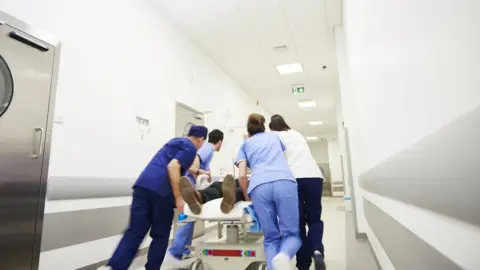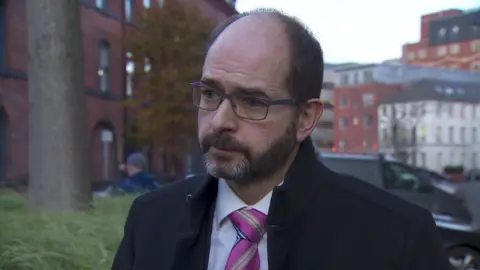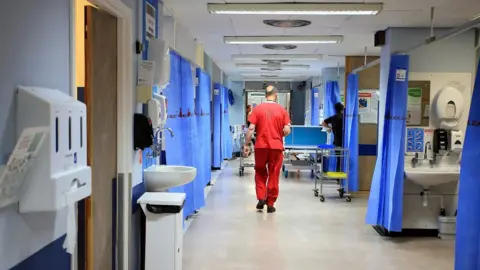NI health system 'at point of collapse' say surgeons
 Getty Images/gpointstudio
Getty Images/gpointstudioNorthern Ireland's healthcare system is "at the point of collapse" the Royal College of Surgeons has claimed after waiting times reached an all-time high.
More than 300,000 people are waiting to see a consultant, according to figures from the Department of Health.
Mark Jones from the Royal College of Surgeons (RCS) described the figures as "distressing" and "unacceptable".
"Patients in the worst affected areas of surgery are waiting up to four years for their first appointment," he said.
Mr Jones, the RCS's deputy director for Northern Ireland, said patients were waiting "far longer than is acceptable for the treatment they urgently need".
"Cancer targets are being missed, and one in five cancer patients are receiving their diagnosis in an emergency department," he added.

The Department of Health figures are stark - 306,180 people are now waiting to see a consultant for the first time.
The figure is 8% more than this time last year and now stands at all-time high for Northern Ireland and across the UK.
For the past decade, those on the front line have been warning of the crisis that is now engulfing some local services.
Despite the new elective care centres set up to treat cataracts, an additional 1,263 patients are still waiting to be seen.
Insufficient funding, poor workforce planning and the lack of government have all contributed to the problem.
'Already collapsed'
Northern Ireland's devolved government has not functioned for almost three years and Mr Jones said health workers across the system are having to operate an a "political vacuum".
"We are working tirelessly in very challenging conditions, but without political support and the required funding to bring about the changes needed, it will be not be possible to fix these enduring problems," he said.
 PA Media
PA MediaLast week, the independent think tank the Nuffield Trust told the BBC that parts of Northern Ireland's health care system have already collapsed.
Responding to Thursday's statistics, Margaret Carr, of Cancer Research UK, said health service staff were working incredibly hard, but workforce shortages in Northern Ireland were contributing to these lengthy delays.
"Unless we see action, this is a problem that's set to get worse because, as the population ages, the number of people with cancer will increase," she said.
"If we're to diagnose more cancers at an early stage and improve survival, a cancer workforce plan is urgently needed."
Apology
The Department of Health reiterated its apology over Northern Ireland's waiting times.
In a statement, it said: "The solutions, however, are extremely challenging. They require sustained investment to address backlogs and build our workforce, as well as the radical reshaping of services."
The department said that, since 2014, additional funding to help bridge the gap between the increased demand for care and the system's capacity to deal with it had been "in much shorter supply".
